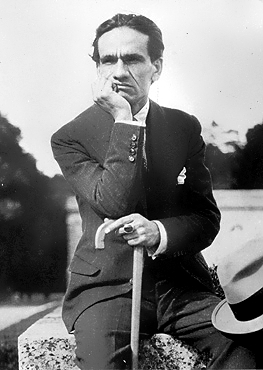<Back to Index>
- Mathematician Magnus Gustaf (Gösta) Mittag-Leffler, 1846
- Poet César Abraham Vallejo Mendoza, 1892
- 4th President of the United States James Madison, 1751
PAGE SPONSOR

César Abraham Vallejo Mendoza (March 16, 1892 – April 15, 1938) was a Peruvian poet. Although he published only three books of poetry during his lifetime, he is considered one of the great poetic innovators of the 20th century in any language. Always a step ahead of the literary currents, each of his books was distinct from the others and, in its own sense, revolutionary.
Clayton Eshleman and José Rubia Barcia's translation of The Complete Posthumous Poetry of César Vallejo won the National Book Award for translation in 1979.
Los Heraldos Negros (The Black Heralds) was completed in 1918, but not published until 1919. Robert Bly, in the 1993 edited volume Neruda and Vallejo: Selected Poems, describes it as "a staggering book, sensual, prophetic, affectionate, wild," and as "the greatest single collection of poems I have ever read." The title is likely suggestive of the four horsemen of the apocalypse, as the book itself touches on topics of religiosity, life and death.
Trilce, published in 1922, anticipated much of the avant-garde movement that would develop in the 1920s and 30s. Vallejo's book takes language to a radical extreme, inventing words, stretching syntax, using automatic writing and other techniques now known as "surrealist" (though he did this before the Surrealist movement began). The book put Latin America at the center of the Avant-garde. Like James Joyce's Finnegans Wake, Trilce borders on inaccessibility.
In España, aparta de mí este cáliz (Spain, Take This Chalice from Me), Vallejo takes the Spanish Civil War (1936 - 1939) as a living representation of a struggle between good and evil forces, where he advocates for the triumph of mankind symbolised in the salvation of the Second Spanish Republic (1931 – 1939) that was being attacked by fascist allied forces led by General Franco. In 1994 Harold Bloom included España, Aparta de Mí Este Cáliz in his list of influential works of the Western Canon.
Poemas Humanos (Human Poems),
published by the poet's wife after his death, is a leftist work of
political, socially oriented poetry. Although a few of these poems
appeared in magazines during Vallejo's lifetime, almost all of them
were published posthumously. The poet never specified a title for this
grouping, but while reading his body of work his widow found that he
had planned a book of "human poems", which is why his editors decided
on this title. Vallejo wrote five plays, none of which were staged or published during his lifetime. Mampar is the subject of a critical letter from producer Louis Jouvet which
says, in summary, "Interesting, but terminally flawed". The text itself
is lost, assumed to have been destroyed by Vallejo. Lock-Out (1930, written in French; a Spanish translation by Vallejo himself is lost) deals with a labour struggle in a foundry. Entre las dos orillas corre el río (1930s) was the product of a long and difficult birth. Titles of earlier versions include Varona Polianova, Moscú contra Moscú, El juego del amor, del odio y de la muerte and several variations on this latter title. Colacho hermanos o Presidentes de América (1934) is a satire displaying Peruvian democracy as a bourgeois farce under pressure from international companies and diplomacy. Other works include La piedra cansada (1937); El tungsteno (1931), a social realist novel depicting the oppression of native Peruvian
miners and their communities by a foreign-owned tungsten mine; Towards the kingdom of the Sciris (1928) is a historic short story dealing with the Incan theme; Habla Salvaje
(1924), literally 'Wild Language', is a short novel which follows the
insanity of a character who lives in the Andes; The children's book, Paco Yunque was
rejected in Spain in 1930 for being too violent for children. But since
it was published in Peru in the 1960s, it became mandatory reading in
the elementary schools in Peru; Rusia en 1931, reflexiones al pie del Kremlin (1931)
is a journalistic work describing Vallejo's impressions of the new
socialist society that he saw being built in Soviet Russia; Rusia ante el II Plan Quinquenal is
a second work of Vallejo's chronicles of his travels in Soviet Russia
focusing on Stalin's second Five Year Plan. The book, originally
written in 1931, was not published until 1965.